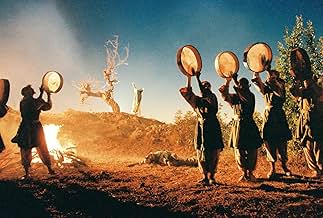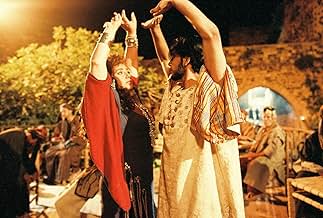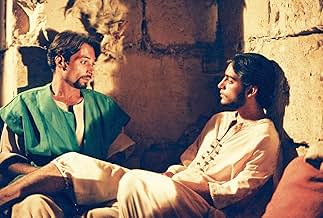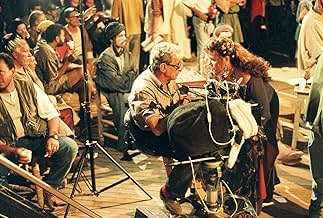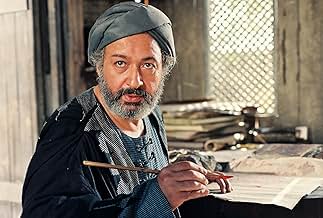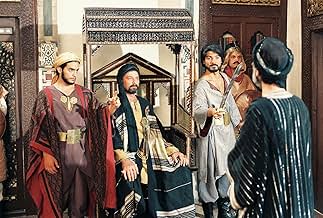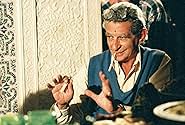Al-massir
- 1997
- 2 घं 15 मि
अपनी भाषा में प्लॉट जोड़ेंThe story is set in the 12th century in Arab-ruled Spanish province Andalusia, where famed philosopher Averroes is appointed grand judge by the caliph and his liberal court judgments are not... सभी पढ़ेंThe story is set in the 12th century in Arab-ruled Spanish province Andalusia, where famed philosopher Averroes is appointed grand judge by the caliph and his liberal court judgments are not liked by everyone. The caliph's political rivals, centered around the leader of a fanatic... सभी पढ़ेंThe story is set in the 12th century in Arab-ruled Spanish province Andalusia, where famed philosopher Averroes is appointed grand judge by the caliph and his liberal court judgments are not liked by everyone. The caliph's political rivals, centered around the leader of a fanatical Islamic sect, force the caliph to send Averroes into exile, but his ideas keep on livin... सभी पढ़ें
- निर्देशक
- लेखक
- स्टार
- पुरस्कार
- 2 जीत और कुल 1 नामांकन
- Averroes
- (as Nour El Cherif)
- Al Mansour, The Caliph
- (as Mahmoud Hemeida)
- Averroes' Wife
- (as Safia El Emary)
- Nasser, The Crown Prince
- (as Khaled El Nabaoui)
- The Caliph's Brother
- (as Seif Abdel Rahman)
- Emir of the Sect
- (as Magdi Idris)
- Gaafar
- (as Hasan El-Adl)
फ़ीचर्ड समीक्षाएं
The movie has one of the grimmest beginnings I've ever seen. It never gets quite that grim again, but the first few minutes are hard to sit through.
After that, the story is interesting, if hard to understand. The philosopher Averroes was a historical figure. He sometimes lived in North Africa, and sometimes in Andalusia. (Nour El-Sherif is an excellent actor, and he makes us believe in Averroes as a real human being, and not just as a philosopher on a pedestal.)
Averroes translated the works of Aristotle into Arabic, and then he wrote commentaries about them. It's possible that these works would have been lost if Averroes had not undertaken this immense intellectual task.
The basic plot of the story circles around the interaction of Averroes with the Caliph, and the Caliph's brother and sons. I have to admit that I got the sense of who was doing what to whom, but I couldn't always understand the details.
This movie is worth seeing because it's colorful, well-acted, and shows us events about which many of us know very little. It has a solid IMDb rating of 7.3, and I recommend it. It will work better on the large screen.
We were able to see it at Rochester's wonderful Dryden Theatre where it was shown--free--as part of a series entitled Salam. The series is being presented to commemorate the lives of the victims of the atrocities at the Al Noor Mosque and the Linwood Islamic Centre in New Zealand, and in solidarity with Muslim people.
The series was organized by the Eastman Museum in partnership with the Islamic Center of Rochester. I commend both institutions for using artistic works to combat and decry hatred.
That was Al Massir, or the Destiny of Youssef Chahine. After his previous movie "El Mohager", Chahine was taken to court by a fundamentalist lawyer who claimed that Chahine presented the prophet Joseph in this movie and this is something forbidden "To show prophets on the screen" by Al Azhar. The lawyer wanted the court to stop showing the movie on the Egyptian screens as well as its distribution outside Egypt.
Regardless of the final conclusion of the court, this case was the major motive behind the script of "Al Massir". Jo (Chahine) wanted to send a clear message to this people "You can never stop ideas from reaching the people, neither by burning the books (last scene of the movie), nor by forbidding movies, etc....' As usual, Averoes in this movie was Chahine himself. Trying to keep a good balance between what the history says about Averoes and what Chahine wanted to reflect on this character, he chose his characters to include all the contradictions he wanted to show. Politics, philosophy, love, integrism, etc.... they are everywhere. This idea of combining Islam with Terrorism bothers Chahine, that is why he started the movie with the french religious authorities burning a man who "Translated the books of this Averoes", so don't you be surprised when Muslims burn "Only" the books of Averoes. This analysis of Chahine is what really makes the movie special. It was expected after what happened to him in his last movie (as I said in the beginning), he could have just make it a good reason for a movie showing Muslims as Terrorists, an easy way to attract a Western spectator. But Jo chose the hard way to do it, showing that among all this terrorism, people are still "Life lovers" as mentioned by the first song. These people who just love their life were those fighting against terrorist - not with weapons - but with love. "We have to know first why they are doing this', said Averoes. Actors were really good specially Nour Elsherif, Mahmoud Hemeida, Khaled Elnabawi and Ahmed Fouad Selim. Mohamed Mounir is as usual the voice of Chahine singing "Sing out loud, we still can sing".
क्या आपको पता है
- ट्रिवियाAccording to an interview actor Nour El-Sherif stated that the role of Ibn Roshd was supposed to be played by director Youssef Chahine himself, but Nour told him that he was not suitable for the role.
- भाव
Caliph's brother: Thoughts have wings. No one can prevent them from flying.
- कनेक्शनFeatured in Humbert Balsan, producteur rebelle (2006)
- साउंडट्रैकAlli sotak
and "Gamr el Hawa", words by Sameh El Kodoussi and Kawssar Mostapha, music by Kamal El Tawil
Performed by Mohamed Mounir
टॉप पसंद
- How long is Destiny?Alexa द्वारा संचालित
विवरण
- रिलीज़ की तारीख़
- कंट्री ऑफ़ ओरिजिन
- भाषाएं
- इस रूप में भी जाना जाता है
- Destiny
- फ़िल्माने की जगहें
- Krak des Chevaliers, Syria(sect training grounds)
- उत्पादन कंपनियां
- IMDbPro पर और कंपनी क्रेडिट देखें
इस पेज में योगदान दें


